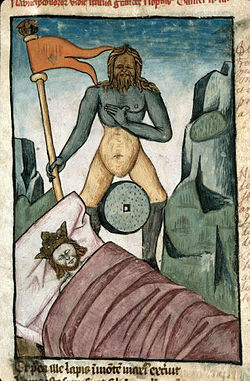Daniel 2
| Daniel 2 | |
|---|---|

Nebuchadnezzar's dream: the composite statue (France, 15th century)
|
|
| Book | Book of Daniel |
| Bible part | Old Testament |
| Order in the Bible part | 27 |
| Category | Ketuvim |
Daniel 2 (the second chapter of the Book of Daniel) tells how Daniel interpreted a dream of Nebuchadnezzar, king of Babylon. The king saw a gigantic statue made of four metals, from its gold head to its feet of mingled iron and clay; as he watched, a stone "not cut by human hands" destroyed the statue and became a mountain filling the whole world. Daniel explained to the king that the statue represented four successive kingdoms beginning with Babylon, while the stone and mountain signified a kingdom established by God which would never be destroyed nor given to another people. (The dream and its interpretation are given in verses 31-45). Nebuchadnezzar then acknowledges the supremacy of Daniel's God and raises him to high office in Babylon.
The book of which he is the hero divides into two parts, a set of tales in chapters 1–6, and the series of visions in chapters 7–12, the tales no earlier than the Hellenistic period, and the visions from the Maccabean era (the mid-2nd century BCE). Chapter 2 in its present form dates from no earlier than the first decades of the Seleucid empire (late 4th/early 3rd centuries BCE), but its roots may reach back to the fall of Babylon and the rise of the Persian Achaemenid empire.
The overall theme of the Book of Daniel is God's sovereignty over history. On the human level Daniel is set against the Babylonian magicians who fail to interpret the king's dream, but the cosmic conflict is between the god of Israel and the false Babylonian gods. What counts is not Daniel's human gifts, nor his education in the arts of divination, but "Divine Wisdom" and the power that belongs to God alone, as Daniel indicates when he urges his companions to seek God's mercy for the interpretation of the king's dreams.
In the second year of his reign Nebuchadnezzar, King of Babylon, is troubled by a dream. He summons his magicians and astrologers to interpret it, but demands that they first tell him what the dream was. They protest that no man can do such a thing, and Nebuchadnezzar orders that they all be executed. This decree also falls on Daniel, but he, through the agency of his God, is able to tell the king the dream. It was a dream of a great statue with a head of gold, arms and chest of silver, belly and thighs of bronze, legs of iron, and feet of mingled iron and clay. A great stone, not cut by human hands, fell on the feet of the statue and destroyed it, and the rock became a mountain that filled the whole world. Daniel then interprets the dream: it concerns four successive kingdoms, beginning with Nebuchadnezzar, which will be replaced by the everlasting kingdom of the God of heaven. Nebuchadnezzar affirms that Daniel's god is "the God of gods and Lord of kings and revealer of mysteries." He lavishes gifts on Daniel and makes him chief of all the wise men and ruler over the province of Babylon.
...
Wikipedia
